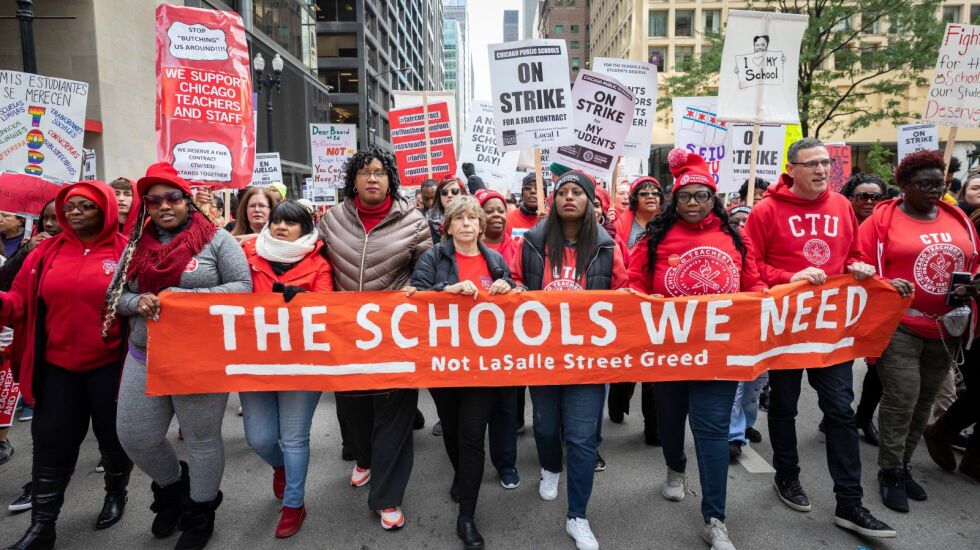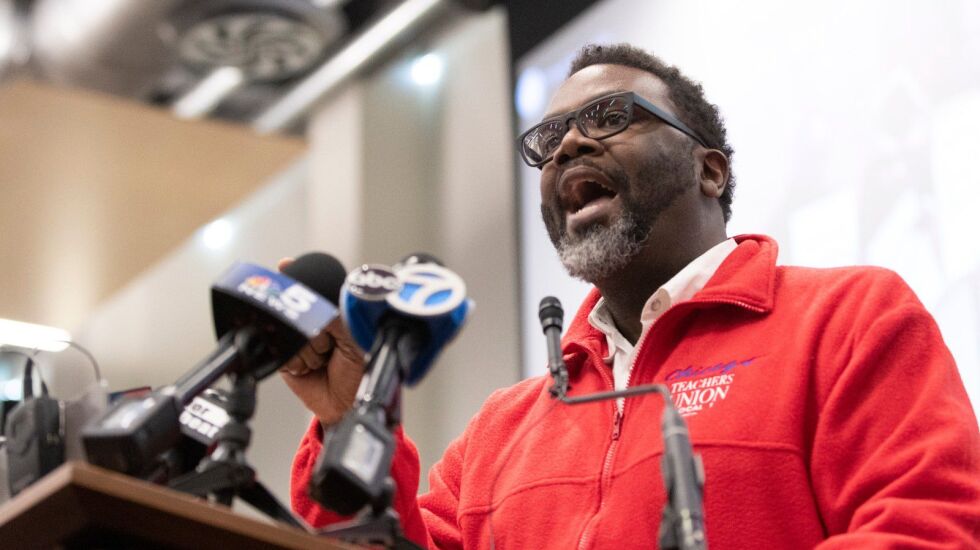
At Brandon Johnson’s victory party Tuesday, Chicago Teachers Union leaders and members had plenty to celebrate.
The CTU spent an astonishing $2.4 million to get Johnson elected mayor and countless hours knocking on doors for him, making connections, revving up crowds.
Johnson’s win was a vindication. The union has spent more than a decade fighting the political establishment. Four years ago, Cook County Board President Toni Preckwinkle, its candidate for mayor, was beaten badly by Lori Lightfoot in the mayoral runoff.
Now, the union faces the challenge of going from outside agitators, the people used to assigning blame, to insiders, the potential targets of that fire.
In introducing Johnson at his victory party, Stacy Davis Gates, the CTU’s president, extended an olive branch to charter schools and police it has opposed: “Tonight, you chose a city where everyone gets a seat. You chose the city where there are charter and public schools. You chose the city where teachers and cops live in the same neighborhood.”
Davis Gates and Johnson painted a picture of a city under Johnson in which everyone gets what they deserve. Johnson said, “There doesn’t have to be any losers.”
Other CTU leaders, though, acknowledge that governing will be hard.
Jesse Sharkey, who stepped down last year as president of the CTU, said he doesn’t expect that wealthy Chicagoans who supported Johnson’s opponent Paul Vallas will suddenly back Johnson: “They’re not going to open their checkbooks and write billion-dollar checks because he beat them by 7,000 votes in an election.”
Johnson might want them to fund programs such as making CTA buses and trains free for Chicago Public Schools students, Sharkey said.

Sharkey said he also thinks the CTU needs not to hold Johnson accountable as well as supporting him. He pointed to former President Barack Obama, saying many progressives were disappointed by his presidency, especially his education policy.
“So it’s not going to work that we elect someone, and then they’re going to go off magically and do what we want,” said Sharkey, who is now a teacher at South Shore International High School. “Our people are gonna have to form connections with people in the neighborhoods, make popular demands in order to make the changes that we want to see happen.”
Jackson Potter, the teachers union’s vice president, said Johnson and the union are in a good position to accomplish their goals given that they’re used to building coalitions.
Still, Potter said, “There’s no shortage of worries. I mean, we have got to find revenue to fulfill the promise of fully funded schools, of housing for all, of mental health care, of health care. These are huge, heavy lifts.”
Like Johnson, Lightfoot pledged to make the city more equitable, said Niketa Barr, executive director of Chicago United for Equity, who was on Lightfoot’s transition committee. Lightfoot established equity offices at City Hall and for CPS.
“Equity is something that actually Chicagoans overwhelmingly support,” Barr said. ”But implementing that is a much more difficult task than saying I believe in this. Lightfoot started to make progress on that, but I think it came into conflict with other priorities.”
To make the transition from agitator to governing, Johnson is going to have to make tradeoffs, said Sadia Sindhu, executive director of the Center for Effective Government at the University of Chicago.
“To do this successfully, one must move beyond talking points from a campaign and lean in on evidence and expertise,” Sindhu said. “There are no silver bullets to the challenges we face.”
Sindhu noted that Johnson has proposed reinstating a head tax paid by businesses based on the number of employees they have, with the mayor-elect saying that would bring in $20 million. Yet with fewer businesses in Chicago post-pandemic, Sindhu said such a tax would likely bring the city much less than that.
Sindhu said Johnson will be held accountable for the impact of his policies.
“Four years from now, the conversation will not be about whether we delivered on a specific campaign policy promise but instead on the intended outcomes — do Chicagoans feel that our children are being set up for educational success? Are our streets safer?” she said.
Potter said that having Johnson as mayor will make achieving the union’s goals easier.
“It is what we hoped for and dreamed for and wished for all along,” he said — “a mayor who could see what it looks like to invest in children and families.”







